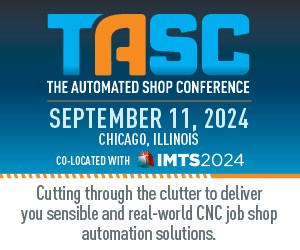Commentary: Competition For The “State” Of Manufacturing? Have At It!
State incentives account for a large share of the success of U.S. manufacturing exports. This is good, as long as states are giving the incentives. “Tennessee: love it or leave it” is an easier motto to obey.
At IMTS in September, activity was great and manufacturing business was strong in spite of the fact that the rest of the U.S. economy seemed to be flirting with (if not actively courting) a recession.
I told people I thought a big part of the reason for the relative strength in manufacturing was the weakness of the dollar. A low value of the U.S. currency makes exports from the U.S. more economical.
However, an article that appeared recently in the United Kingdom’s Financial Times said the value of the dollar is not the primary reason why manufacturing in the United States has been so attractive lately. Instead, the bigger reason is the incentives that various states have been offering companies to build manufacturing facilities within their borders.
Tennessee will give Volkswagen $577 million in incentives to build a new plant. Alabama will give $811 million to ThyssenKrupp.
“It may sound like a joke, but it can be cheaper than you imagine to manufacture [in the U.S.],” says one German automotive chairman who is quoted in the article.
Personally, I think this is great. I see state government incentives for businesses in an entirely different light from federal government incentives for the same businesses.
The difference is freedom of movement. The federal government has fewer reasonable checks on the way it uses resources, because it holds its citizens hostage. The catchphrase, “America: love it or leave it,” is not really an injunction that the average citizen can obey. Whether or not a citizen loves what the government is doing, relocating out of the country is impractically difficult.
By contrast, citizens of state governments can more easily vote with their feet. Moving to another state is not painless, but it is not all that terribly difficult to do. Thus, if a state government is overtaxing its citizens in order to spend foolishly or wastefully, then ultimately the day will come when a large number of businesses and individuals relocate to states that are not quite so imprudent.
The converse is also true! If a state manages to create a fertile and attractive climate for high-value manufacturing work, then businesses will readily migrate there, and citizens of other states will move there to find better jobs. This effect benefits the whole country.
Some might ask, “What about the problem of having all 50 states competing among themselves?” My answer is: What problem? Let them compete. If the United States competes with itself, then the United States wins either way.
We don’t have to look far for precedents of this model. In our own metalworking industry, there are various competing makers of cutting tools that are owned by a common parent company. The internal competition makes each of the companies stronger and ultimately helps the overall group to adapt more responsively to its customers’ changing needs.
An even closer example is the publisher of the Web site you are viewing now. Gardner Publications produces metalworking magazines whose reader and advertiser bases partially overlap. The primary result of this internal competition is that the readers can better tailor their attention, and advertisers can better tailor their investments, to whatever mix of media outlets makes the most sense.
One of my favorite authors is Alexis de Tocqueville. I am awed by what he did. He wrote a book in the 1830s—Democracy in America —that describes the American government and character more penetratingly than many of the current affairs books that are on the store shelves today.
One of his insights was an appreciation for the separation of powers within our government. However, to him, the most important separation was not the division among executive, legislative and judicial branches. He argued that the far more important separation was the division between federal, state and local governments.
Government spending or government size does not necessarily produce bad government. Instead, tyranny is the result of government claiming or blundering into areas of authority over which it has no business. Using citizens’ monies to coax manufacturers into regions of the United States is perfectly appropriate, so long as the affected citizens agree. To ensure that the affected citizens do agree, the regional governments should be the only governments doing the coaxing.
Comments? E-mail Peter Zelinski.
Read Next
3 Mistakes That Cause CNC Programs to Fail
Despite enhancements to manufacturing technology, there are still issues today that can cause programs to fail. These failures can cause lost time, scrapped parts, damaged machines and even injured operators.
Read MoreThe Cut Scene: The Finer Details of Large-Format Machining
Small details and features can have an outsized impact on large parts, such as Barbco’s collapsible utility drill head.
Read MoreObscure CNC Features That Can Help (or Hurt) You
You cannot begin to take advantage of an available feature if you do not know it exists. Conversely, you will not know how to avoid CNC features that may be detrimental to your process.
Read More
.jpg;width=70;height=70;mode=crop)





.png;maxWidth=300;quality=90)











